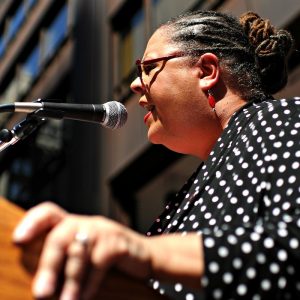In this moment of corporate power run amok, with each new headline demanding a response, and with so much at stake, it’s important to remember that there is a long history of people challenging corporate power — and winning.
In honor of Women’s History Month, we will be writing a series of articles on a few of the activists we admire, are inspired by, and on whose shoulders we stand.
Chicago classrooms sat empty during the first week of classes in 2012. But the streets were packed. Tens of thousands of teachers, parents, and students marched through the city’s neighborhoods wearing red Chicago Teachers Union T-shirts. They waved signs in the air: “Take back Chicago!” “I stand with CPS teachers!” and “Fair contract now!”
This seven-day strike was one of the strongest displays of people power the U.S. had seen in the last decade. Led by the Chicago Teachers Union (CTU) and its president, Karen Lewis, the strike elevated issues of school privatization and education inequity to national attention. Beyond headlines, the CTU strikers motivated educators from all over the country to stand up for the public support and funding that students and teachers deserve.
Lewis’ journey to that moment of leadership started early. She grew up in the South Side of Chicago in a family of teachers, and attended Chicago public schools. She spoke three languages, played the flute, loved the opera, and briefly considered a career in the medical field. But the classroom drew her back in. After accepting a job as a substitute chemistry teacher, she taught for another 20 years.
In 1988, Lewis served on a school council. During that time, she witnessed the principal use his power to channel money to his friends. Furious, Lewis jumped into union organizing, which she saw as a pathway to fight against injustice. She became a member of the CTU as her teaching career continued, and by 2008 she served as an active delegate.
On Sundays, she hosted potluck meals to discuss strategies for fighting school closures and charter school openings, which would eventually turn into Caucus of Rank and File Educators, a progressive, grassroots-driven chapter of the union. She was elected president in 2010 and served through 2014.
Lewis was not afraid to stand up to the corporate interests that threatened Chicago’s schools and students. She questioned the intentions of Stand for the Children, a corporate-backed front group that promoted school privatization. In a public debate with the organization’s director, she pointed out how its donors, including the foundation started by Walmart’s founders, had earned their wealth off the backs of low-paid workers.
Lewis’ term as CTU’s president began during a time when schools in low-income and Black communities were closing, only to be replaced by charter schools. The union worried about the lack of accountability at these schools, many of which are run and funded by private corporations or nonprofits, and systems for holding the bureaucracy and leadership accountable. They saw the city’s push to open these privately run schools as a way to “get rid of union teachers.”
Lewis stood firm on issues of job cuts, class size increases, the expansion of charter schools and standardized tests. This posed a threat to the newly elected Chicago Mayor, Rahm Emmanuel, whose proposals for longer school days and teacher evaluations systems failed to meaningfully address the impoverished conditions that low-income and Black students lived in that made it impossible for them to thrive.
After months of back and forth with Emmanuel, the union voted to go on strike. They fought for benefits and compensation for teachers as well as education reform policies that would benefit all students.
Not all teacher demands were met by the end of the strike. The school day was expanded and CTU ended the negotiation without confirming that laid-off teachers would be given more job consideration. However, the union counted several wins — from salary increases and protected benefits, to the tweaking of the teacher evaluation policy, which the union found problematic. The struggle for equitable public education continues to this day.
After the 2012 strike, Lewis continued to lead the union through negotiations, including a smaller walkout in 2016. Lewis fully retired in 2018 after nearly thirty years of organizing with the CTU.
Lewis passed away on February 7, 2021. Her colleagues remembered her for her ability to fight, love, and lead. They wrote in a statement: “We have more fighters for justice and equity because of Lewis, and because she was a champion — the people’s champion…”
Check out our post on Berta Cáceres, Indigenous and environmental activist, here.
Photo credit: Viewminder on Flickr.







